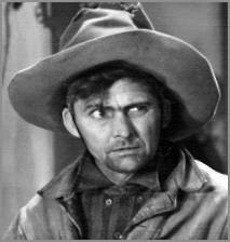Keeping It Far Too Real: The Blackjack Ward Story
 While snooping about some old Google-able papers the other day, I stumbled across this true-crime tidbit about a 1940 murder case involving a pair of Hollywood extras. The killing took place in Gower Gulch, a street corner where former cowboys would gather in hopes of being picked to appear in B-grade Westerns—much like day laborers now congregate in shopping-mall parking lots with an eye toward scoring sheetrocking work. The Unsung Joe picks up the story from there:
While snooping about some old Google-able papers the other day, I stumbled across this true-crime tidbit about a 1940 murder case involving a pair of Hollywood extras. The killing took place in Gower Gulch, a street corner where former cowboys would gather in hopes of being picked to appear in B-grade Westerns—much like day laborers now congregate in shopping-mall parking lots with an eye toward scoring sheetrocking work. The Unsung Joe picks up the story from there:
At any time of day, between 25 and 50 characters in Stetsons and checked shirts could be seen on the sidewalk, killing time and — because all these men had once been genuine cowboys, unlike the cowboy stars like Roy Rogers or Gene Autry — reminiscing about the old days before the great ranches of the west had been broken up into farms and homesteads, when they'd been able to get real work driving cattle across the open range…
Blackjack Ward was one such man. He'd been a range rider most of his life, and claimed to have served as Pancho Villa's right-hand man in the Mexican revolution of 1910(1) but, by 1927, when he was in his late 30s, the scarcity of work on the range had brought him to Hollywood. His skill on horseback kept him busy in the hundreds upon hundreds of westerns that required competent riders, and his villainous scowl and expressive eyes secured him plenty of work as background henchmen…
On the morning of February 23, 1940, around 50 cowboy extras were standing around outside the drugstore on the corner of Gower and Sunset. Blackjack was there, and so was Johnny Tyke, another western bit-part player who had an impressive criminal record and was currently wanted by the police in connection with a string of hold-ups.
"I had known Tyke for quite a while — I fed and helped that varmint for years," said Blackjack. "A few months ago, he was in jail for drunk driving, but I didn't go to see him and, when he got out, he kept pestering me because of it. We had arguments and he threatened me. One day he said he was going to beat me to death or else use his Bowie knife on me.
"Well, we met in the drugstore where the boys hang out, and Tyke started in again. He got real abusive and called me names no man worth the powder to blow him to hell will take back where I come from in old Arizona, but I says, 'Look here, you're bigger than me and you probably could whip me. There ain't no sense to this anyway, and I don't want no trouble.'
"I got in my car and started to drive away. Tyke jumped in front of the car and yelled, 'No you don't. Let's settle this right now.'
"Well, I usually carry my old gun with me; just a sort of habit a man gets into when he spends a lot of time riding the range. When Tyke tried to get in the car, I shot at him once through the windshield and drove off."
Read the rest of the account for details on how the killing divided the henchmen community, and how Ward could never quite escape the claws of justice after his run-in with Tyke. The piece leaves me wondering, though, about the economics of the Hollywood system back then. What sort of life could one lead on a henchman's salary? And how might it compare to what modern-day bit players are able to eke out?




